Becoming Cascadian: The Intersection of Bioregionalism and Poetics
Paul E. Nelson serves as founding director of Seattle Poetics LAB (SPLAB) and the Cascadia Poetry Festival. He is the author of American Sentences (Apprentice House, 2015), A Time Before Slaughter (Apprentice House, 2010), and Organic in Cascadia: A Sequence of Energies (Lumme Editions, 2013), and coeditor of the anthologies Make It True: Poetry From Cascadia (Leaf Press, 2015) and 56 Days of August: Poetry Postcards (Five Oaks Press, 2017). Nelson has been engaged in a twenty-year bioregional cultural investigation of Cascadia.
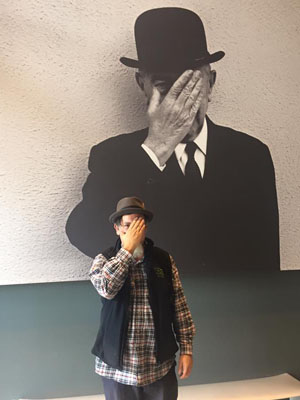 Becoming Cascadian was a retreat in Seattle’s diverse Rainier Beach neighborhood—an outgrowth of Seattle Poetics LAB’s Cascadia Poetry Festival. While the festivals are exciting, it takes a great deal of resources to present such an event. The SPLAB Board decided that while we look for funding to continue the festival, it would be good to work on a more intimate level. Becoming Cascadian allowed participants to go deeper into their own writing practices and experiences of place.
Becoming Cascadian was a retreat in Seattle’s diverse Rainier Beach neighborhood—an outgrowth of Seattle Poetics LAB’s Cascadia Poetry Festival. While the festivals are exciting, it takes a great deal of resources to present such an event. The SPLAB Board decided that while we look for funding to continue the festival, it would be good to work on a more intimate level. Becoming Cascadian allowed participants to go deeper into their own writing practices and experiences of place.
There were free public events: a Zen Meditation session at the Seattle University Ecosangha; “The Practice of Outside,” a presentation with P&W–supported writer Andrew Schelling; a tour of Kubota Garden with Seattle University philosophy professor Jason Wirth; and a closing reading at Seattle’s all-poetry bookstore Open Books. In between the public events were breakout sessions offered by participants.
One session was on cultural appropriation. It’s a hot topic in Canada now, as Cascadia includes all of British Columbia west of the Continental Divide. The treatment of First Nations people, as they are called in Canada, is reprehensible, and there’s a lot of anger regarding writers monetizing indigenous culture. Adelia MacWilliam from Cumberland, B.C. led this session.
The Kubota Garden tour, led by Wirth, explored the historic spiritual nature of the garden, the life of Fujitaro Kubota, and the Japanese American history in the neighborhood, including the internment of Japanese American citizens during World War II, an event with eerie similarities to current American xenophobia.
Mark Gonnerman’s session was “Living in Place With Peter Berg and Gary Snyder in Mind.” Snyder has written that, “real people stay put,” which in North America is “a new thing!” Snyder recommends making five hundred year plans and not the ethos of the old bumper sticker that said: “Earth First: Then We Log the Other Planets.” Gonnerman put things into perspective saying we humans are the first species in history “that can prevent their own extinction.”
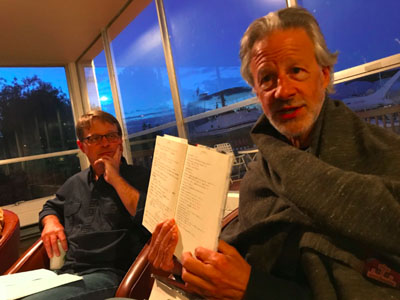 Schelling’s keynote talk was for “poets and bioregional visionaries,” suggesting we go outdoors and learn something of our bioregion. He contrasted his Southern Rocky Mountain bioregion and Cascadia, noting the difference between the wet, logged, maritime Puget Sound region, and his dry high country. He discussed respective medicine powers the bioregions share, and noted how the Douglas Firs in the high country are puny compared to those in Cascadia. He ended with a story. What may not be well-known about Schelling is that, perhaps through his multi-decade study of Jaime de Angulo, he’s become a master storyteller. After the festival he said:
Schelling’s keynote talk was for “poets and bioregional visionaries,” suggesting we go outdoors and learn something of our bioregion. He contrasted his Southern Rocky Mountain bioregion and Cascadia, noting the difference between the wet, logged, maritime Puget Sound region, and his dry high country. He discussed respective medicine powers the bioregions share, and noted how the Douglas Firs in the high country are puny compared to those in Cascadia. He ended with a story. What may not be well-known about Schelling is that, perhaps through his multi-decade study of Jaime de Angulo, he’s become a master storyteller. After the festival he said:
“To redefine our lives and the places we live by bioregion, rather than by political boundaries, is not the work of a single morning. It will require small cadres of committed people who become nature literate, write instructive poems and essays, and gradually make sense to their neighbors. This program, Becoming Cascadia, was one node in a larger effort that has been developing…. Concluding with poetry gave ceremonial fragrance.”
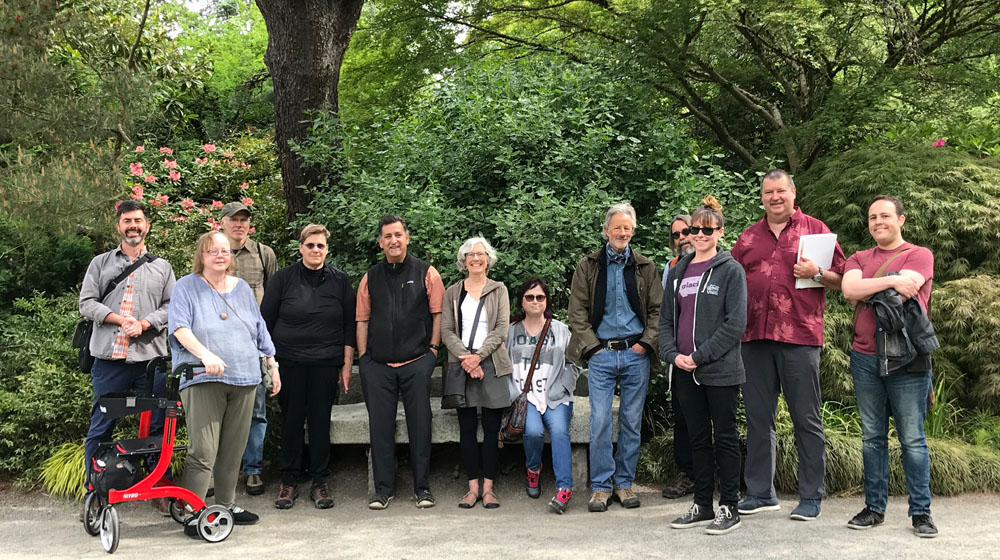
Support for Readings & Workshops in Seattle is provided by an endowment established with generous contributions from the Poets & Writers Board of Directors and others. Additional support comes from the Friends of Poets & Writers.
Photos: (top) Paul E. Nelson (Credit: Bhakti Watts). (middle) Andrew Schelling with Jared Lesing (Credit: Paul Nelson). (bottom) At the Kubota Garden with participants (Credit: Paul Nelson).




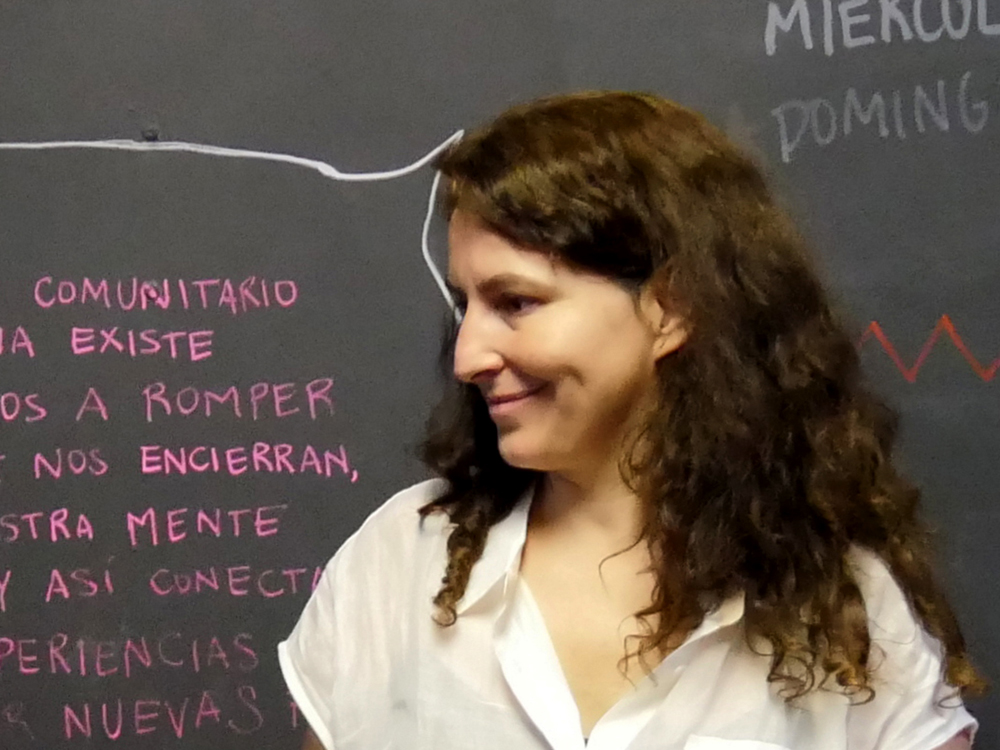 How did your work with the
How did your work with the 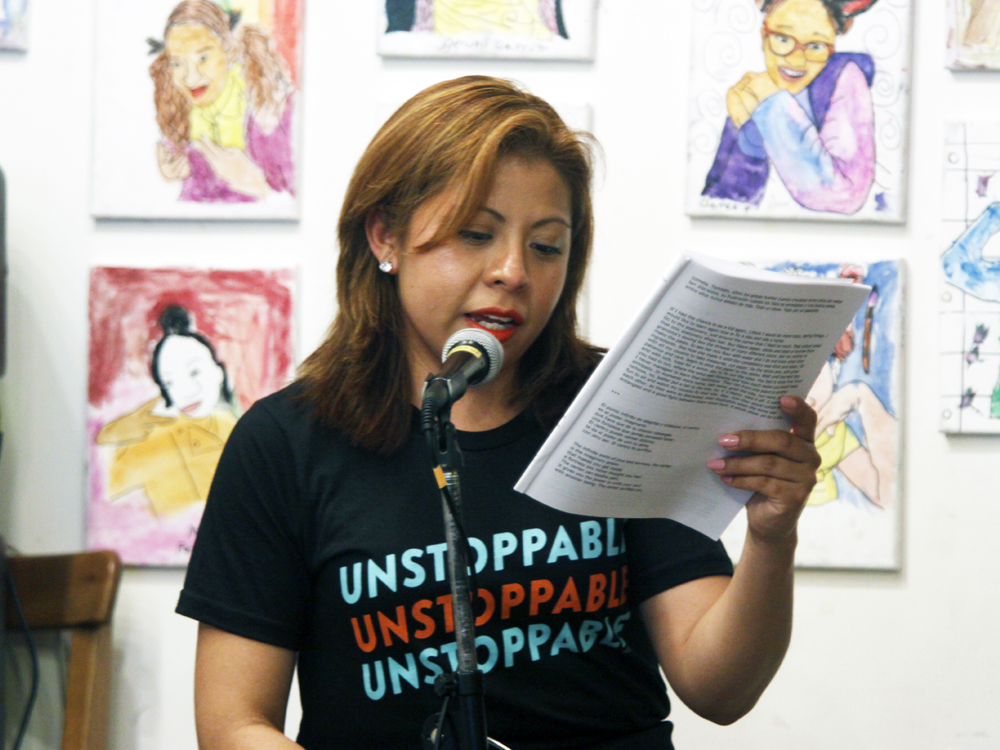 We talk about how the ability to create with words isn’t something alien to us—something that belongs only to those who had the privilege of studying and spending time reading—but rather something that we all do when we speak to each other in everyday life. We also talk about how writing is generated starting with a draft and then through multiple rewritings, not in one shot and then set in stone. These conversations also help us get writing.
We talk about how the ability to create with words isn’t something alien to us—something that belongs only to those who had the privilege of studying and spending time reading—but rather something that we all do when we speak to each other in everyday life. We also talk about how writing is generated starting with a draft and then through multiple rewritings, not in one shot and then set in stone. These conversations also help us get writing.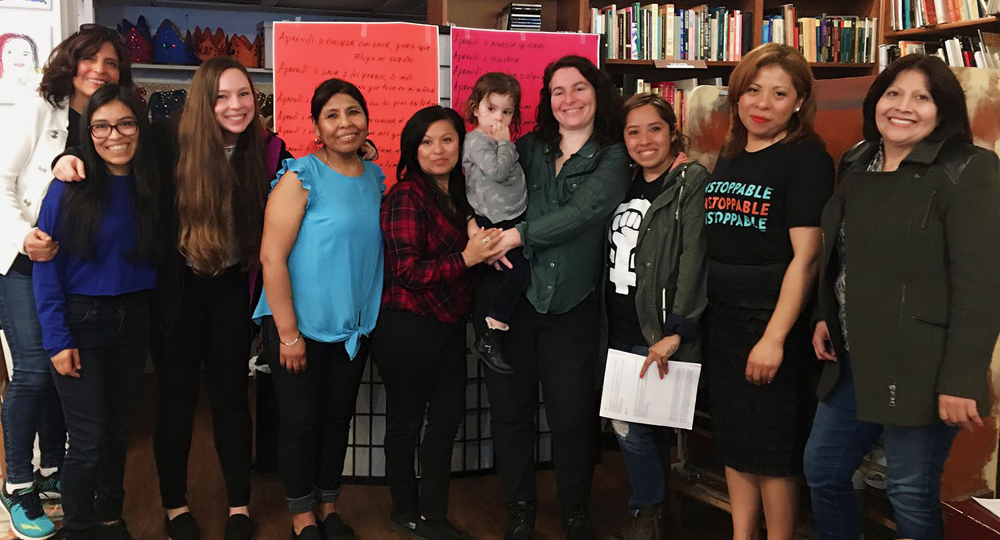
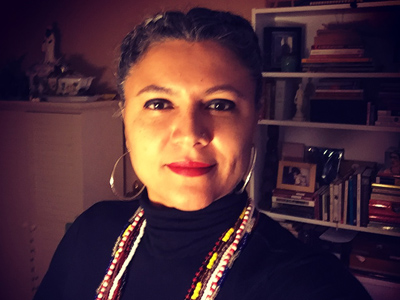 For almost twelve years, the NYC Latina Writers Group (NYCLWG) has been meeting monthly for writing workshops and literary events. Our writers have gone on to have successful writing careers, developing one-woman shows, and writing plays. They have published and self-published memoirs and chapbooks and have started their own blogs. While many of us are publishing, some of our writers have lost hope. This was when our director of programs Wendy Angulo and I decided to look at the needs of the writers within our collective. What we discovered was that most of us needed more time to write and more workshops that would help us hone our craft.
For almost twelve years, the NYC Latina Writers Group (NYCLWG) has been meeting monthly for writing workshops and literary events. Our writers have gone on to have successful writing careers, developing one-woman shows, and writing plays. They have published and self-published memoirs and chapbooks and have started their own blogs. While many of us are publishing, some of our writers have lost hope. This was when our director of programs Wendy Angulo and I decided to look at the needs of the writers within our collective. What we discovered was that most of us needed more time to write and more workshops that would help us hone our craft.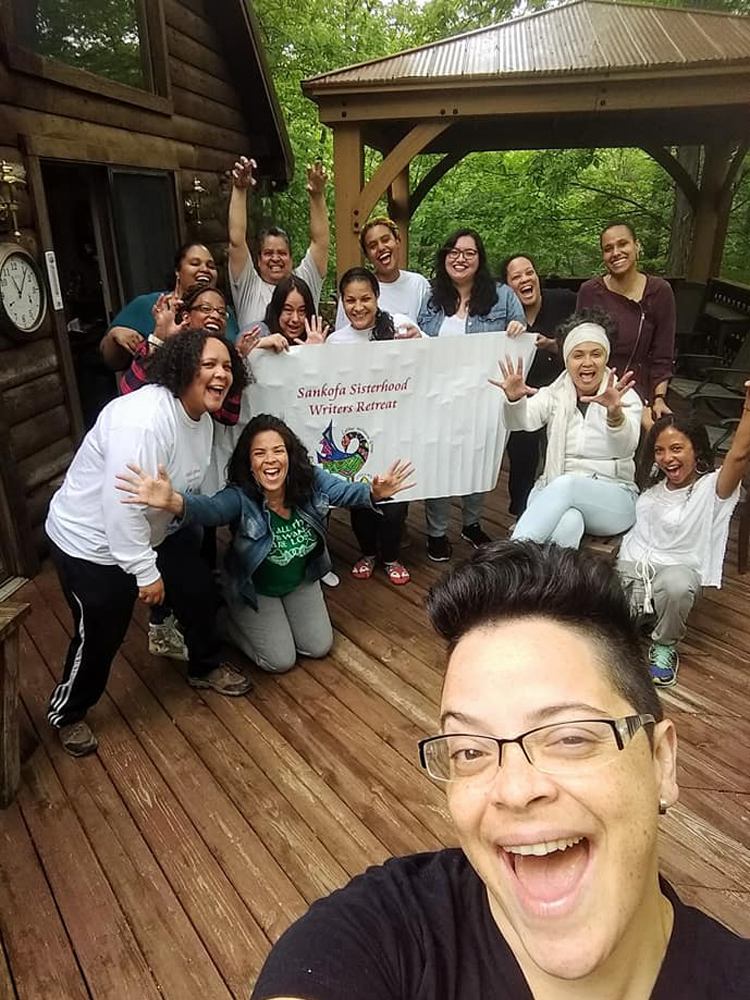 This year’s theme at Sankofa was “Strengthening the Writer’s Core.” Our workshops were centered on writing the story from the inside out. Each facilitator took the writers through prompts and activities to help get inside the stories we are writing and to feel everything that must be felt in order to find and show the truth in the story, poem, or essay.
This year’s theme at Sankofa was “Strengthening the Writer’s Core.” Our workshops were centered on writing the story from the inside out. Each facilitator took the writers through prompts and activities to help get inside the stories we are writing and to feel everything that must be felt in order to find and show the truth in the story, poem, or essay.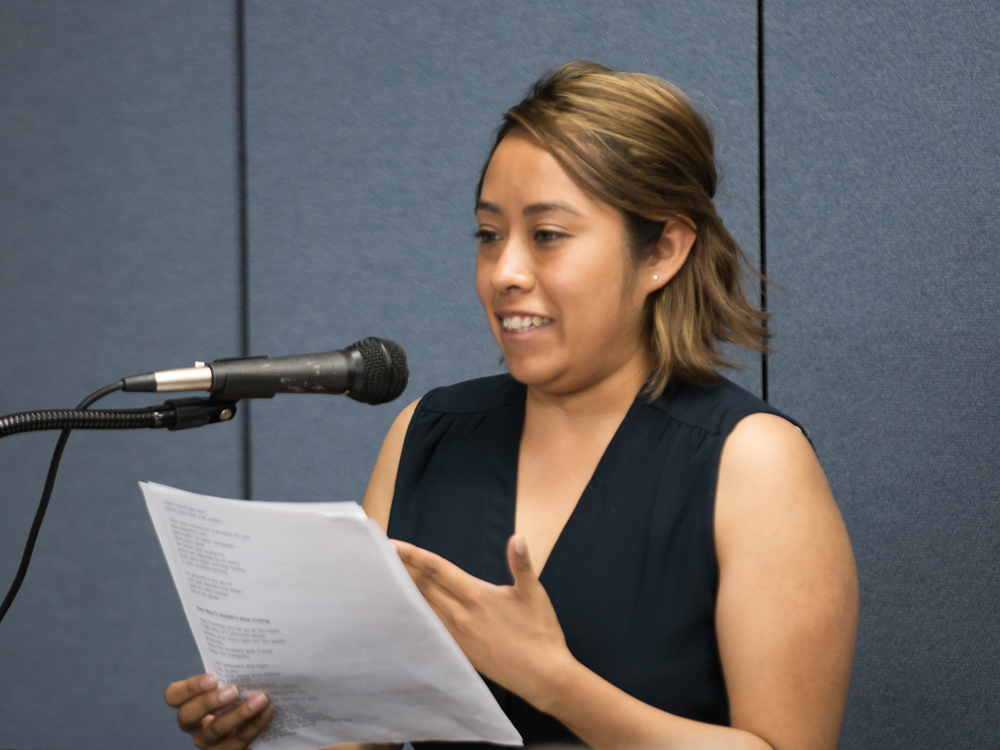 Now in its ninth year, the Connecting Cultures Reading, sponsored and organized by Poets & Writers, celebrates the diversity of our literary community by bringing together several groups who’ve been funded by the Readings & Workshops program. This year’s reading took place at the Center for Book Arts, and featured writers representing National Domestic Workers Alliance, the Newtown Literary Alliance, Leslie-Lohman Museum of Gay and Lesbian Art, Voices From War, and the What Would an HIV Doula Do? collective.
Now in its ninth year, the Connecting Cultures Reading, sponsored and organized by Poets & Writers, celebrates the diversity of our literary community by bringing together several groups who’ve been funded by the Readings & Workshops program. This year’s reading took place at the Center for Book Arts, and featured writers representing National Domestic Workers Alliance, the Newtown Literary Alliance, Leslie-Lohman Museum of Gay and Lesbian Art, Voices From War, and the What Would an HIV Doula Do? collective.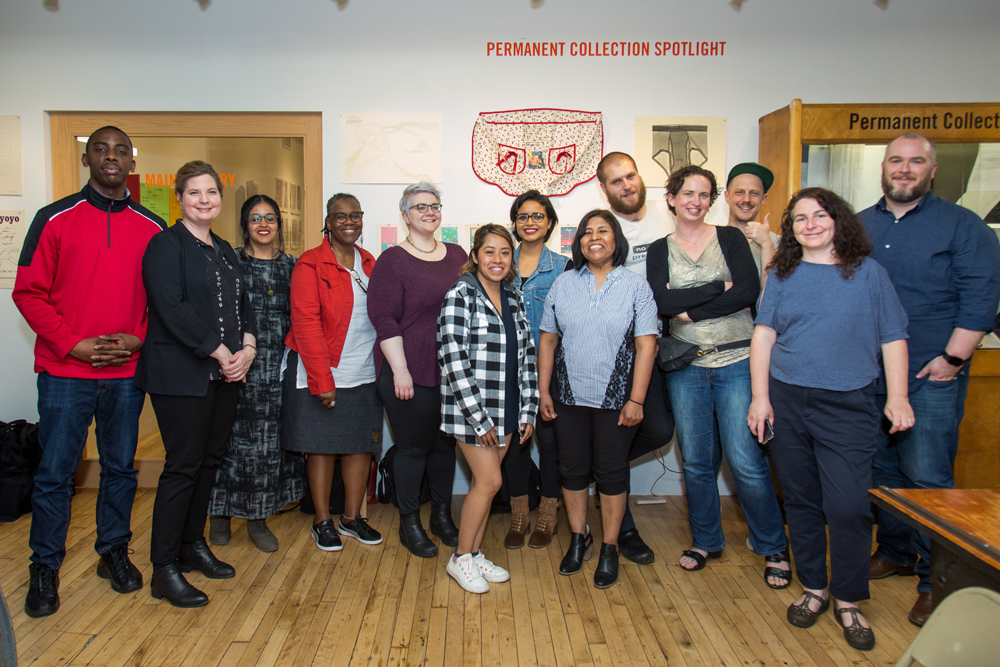
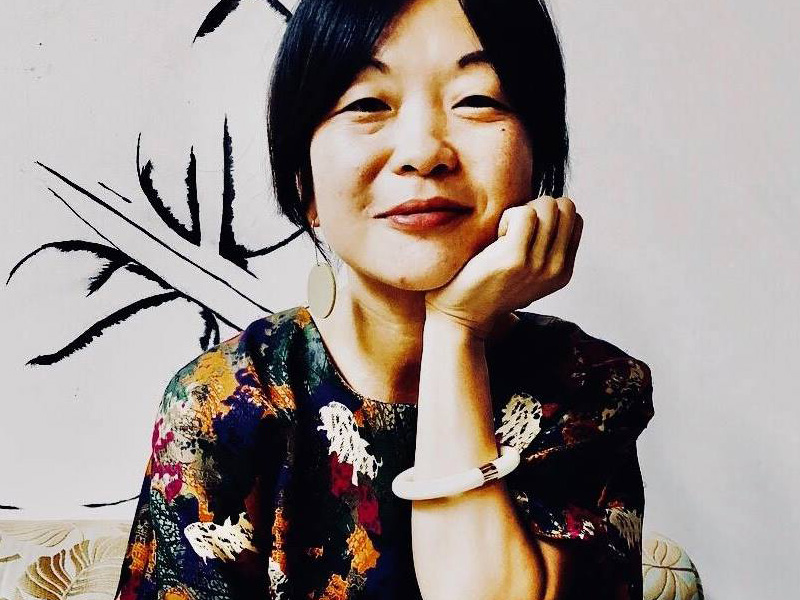 There are various facts we know related to mental health and stigma within the Asian American Pacific Islander (AAPI) community. According to the Centers for Disease Control, Asian Americans tend to be disproportionately impacted by mental health issues, but are less inclined to seek help for a multitude of reasons: in order to “save face”; because language barriers and the lack of culturally and linguistically responsive services effectively deny services to many first-generation AAPI residents; and due to ongoing social and cultural stigmas surrounding accessing mental health supports. Because of this, many young Asian Americans choose to keep their mental health issues within their family and/or seek religious advice, rather than professional help.
There are various facts we know related to mental health and stigma within the Asian American Pacific Islander (AAPI) community. According to the Centers for Disease Control, Asian Americans tend to be disproportionately impacted by mental health issues, but are less inclined to seek help for a multitude of reasons: in order to “save face”; because language barriers and the lack of culturally and linguistically responsive services effectively deny services to many first-generation AAPI residents; and due to ongoing social and cultural stigmas surrounding accessing mental health supports. Because of this, many young Asian Americans choose to keep their mental health issues within their family and/or seek religious advice, rather than professional help.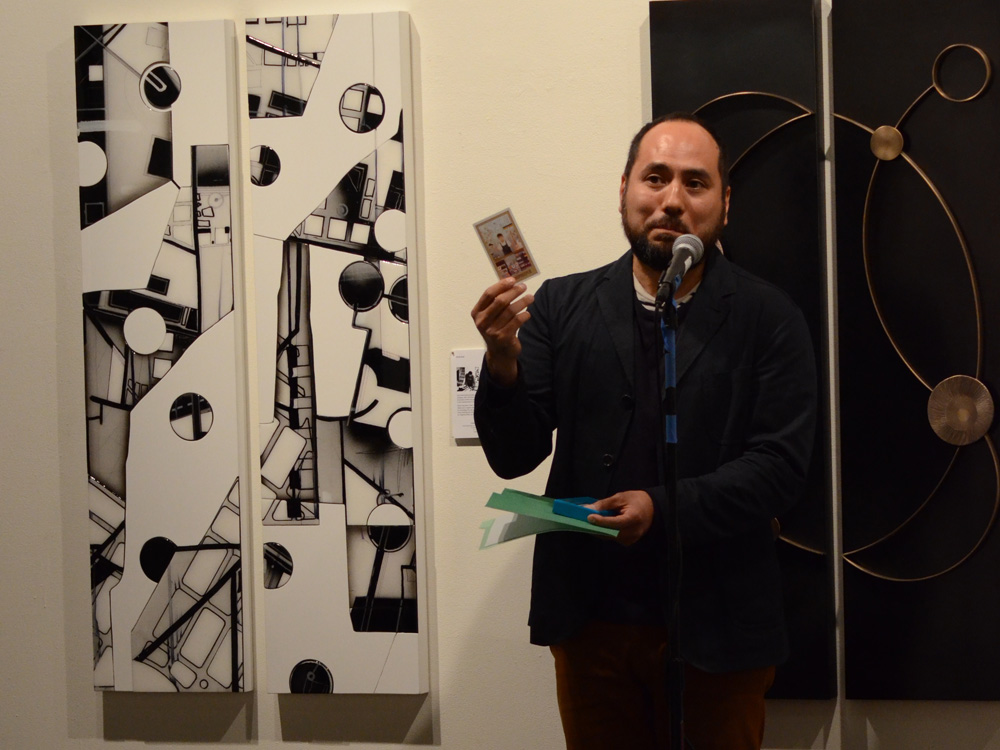 “Open in Emergency,” curated as a dynamic and interactive night market, integrated readings by P&W–supported poet Brandon Som and scholar Simi Kang, and interactive tables, which included tarot card readings using AALR’s beautiful Asian American Tarot deck and “Corner of Heart-to-Hearts” conversations catalyzed by cards created by Chad Shomura and illustrated by Yumi Sakugawa. This open space allowed the audience and contributors to interact in a way that was more relational and conversational. Audience members listened to the readings, but were also able to walk around the gallery and interact with the different stations.
“Open in Emergency,” curated as a dynamic and interactive night market, integrated readings by P&W–supported poet Brandon Som and scholar Simi Kang, and interactive tables, which included tarot card readings using AALR’s beautiful Asian American Tarot deck and “Corner of Heart-to-Hearts” conversations catalyzed by cards created by Chad Shomura and illustrated by Yumi Sakugawa. This open space allowed the audience and contributors to interact in a way that was more relational and conversational. Audience members listened to the readings, but were also able to walk around the gallery and interact with the different stations.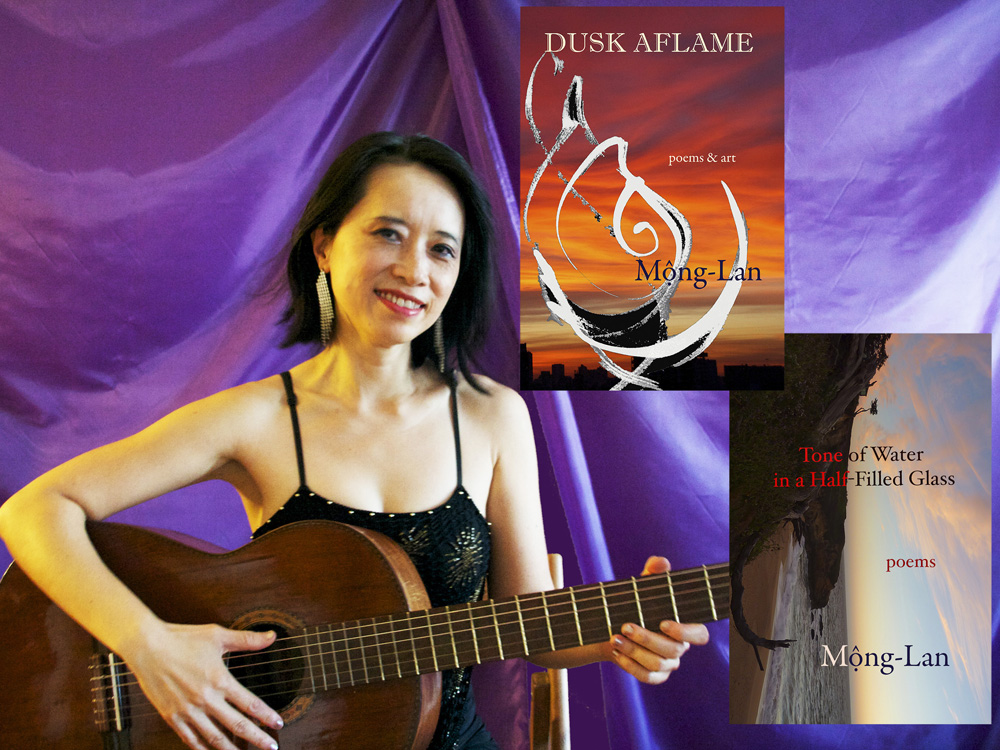 I’m grateful that Poets & Writers has cosponsored me for three events: The Poets in Play poetry reading at the Soup Full Café in Corning, New York; a poetry writing workshop a day later at the ARTS Council of the Southern Finger Lakes; and a convivial reading at Wheeler Hill hosted by poet Michael Czarnecki of FootHills Publishing, which published my most recent chapbook, Tone of Water in a Half-Filled Glass. Finally, I taught a workshop for the Watkins Glen Writers Group, and later gave a reading. Through the generosity of Poets & Writers, I was able to promote my seventh book, Dusk Aflame: poems & art, and new chapbook.
I’m grateful that Poets & Writers has cosponsored me for three events: The Poets in Play poetry reading at the Soup Full Café in Corning, New York; a poetry writing workshop a day later at the ARTS Council of the Southern Finger Lakes; and a convivial reading at Wheeler Hill hosted by poet Michael Czarnecki of FootHills Publishing, which published my most recent chapbook, Tone of Water in a Half-Filled Glass. Finally, I taught a workshop for the Watkins Glen Writers Group, and later gave a reading. Through the generosity of Poets & Writers, I was able to promote my seventh book, Dusk Aflame: poems & art, and new chapbook.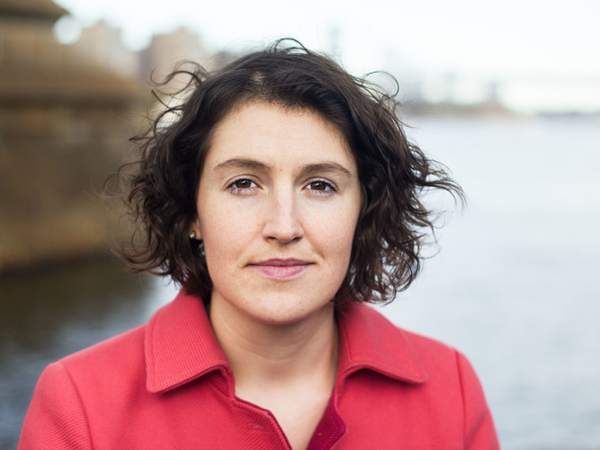 Office Hours Poetry Workshop emerged from the deep need for a program that supports and elevates post–MFA writers. The goal: to build a no-fee workshop that accommodates full-time work schedules, childcare needs, and celebrates writers who are POC, LGBTQ+, women-identified, adjunct instructors, and any and all combination. More than anything, I wanted to compensate our writers. The Poets & Writers’ Readings & Workshops grant became a profound way to do so.
Office Hours Poetry Workshop emerged from the deep need for a program that supports and elevates post–MFA writers. The goal: to build a no-fee workshop that accommodates full-time work schedules, childcare needs, and celebrates writers who are POC, LGBTQ+, women-identified, adjunct instructors, and any and all combination. More than anything, I wanted to compensate our writers. The Poets & Writers’ Readings & Workshops grant became a profound way to do so.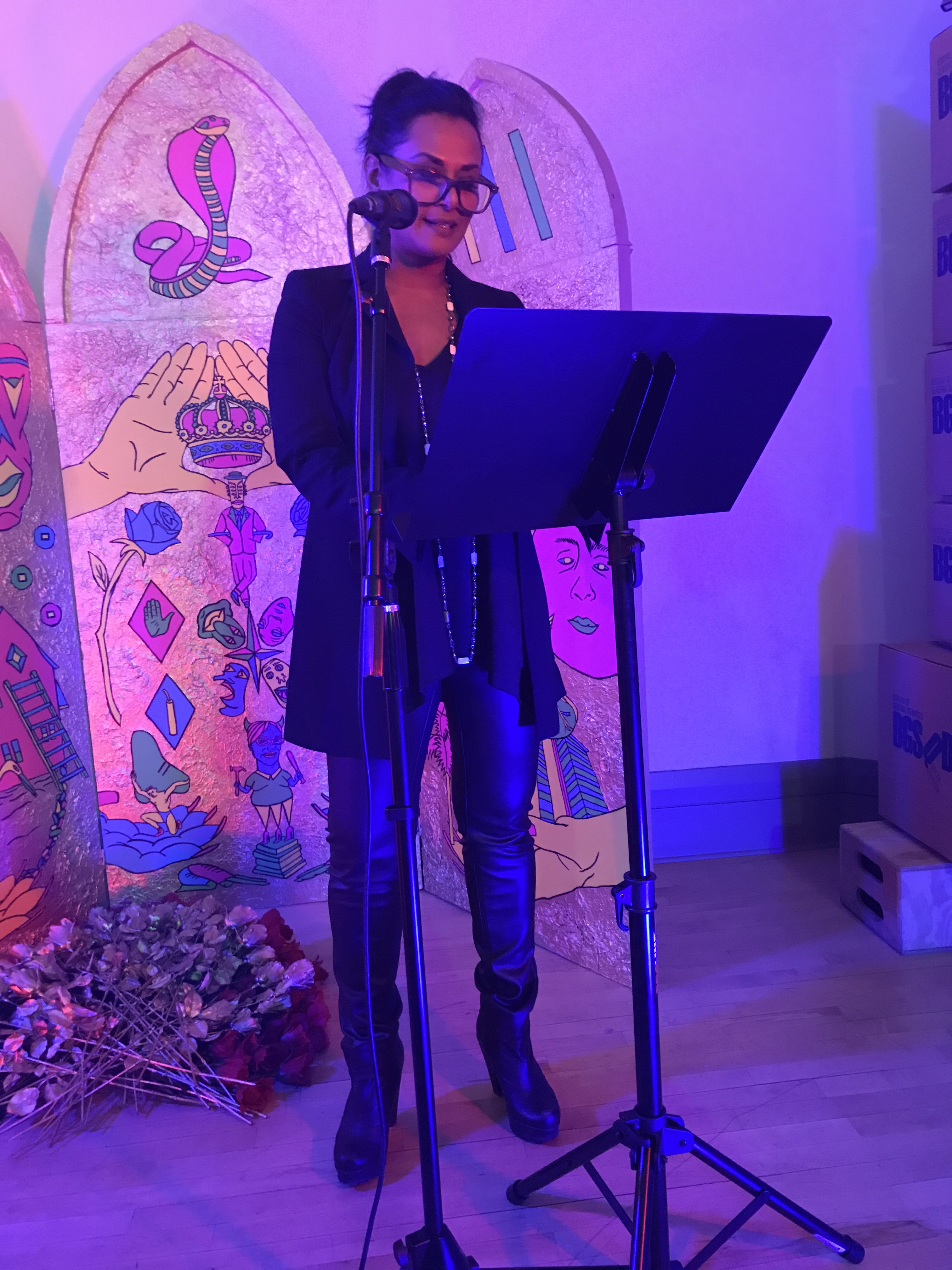 June Jordan said that poetry is a political act because it involves truth telling. Very often this means writing through a lens counter to mainstream culture, embodying our power and vulnerabilities on the page, and practicing radical empathy with fellow artists. For this reason, it was an immense pleasure to introduce the Office Hours Spring Showcase fellows at the Bureau of General Services–Queer Division (BGSQD).
June Jordan said that poetry is a political act because it involves truth telling. Very often this means writing through a lens counter to mainstream culture, embodying our power and vulnerabilities on the page, and practicing radical empathy with fellow artists. For this reason, it was an immense pleasure to introduce the Office Hours Spring Showcase fellows at the Bureau of General Services–Queer Division (BGSQD).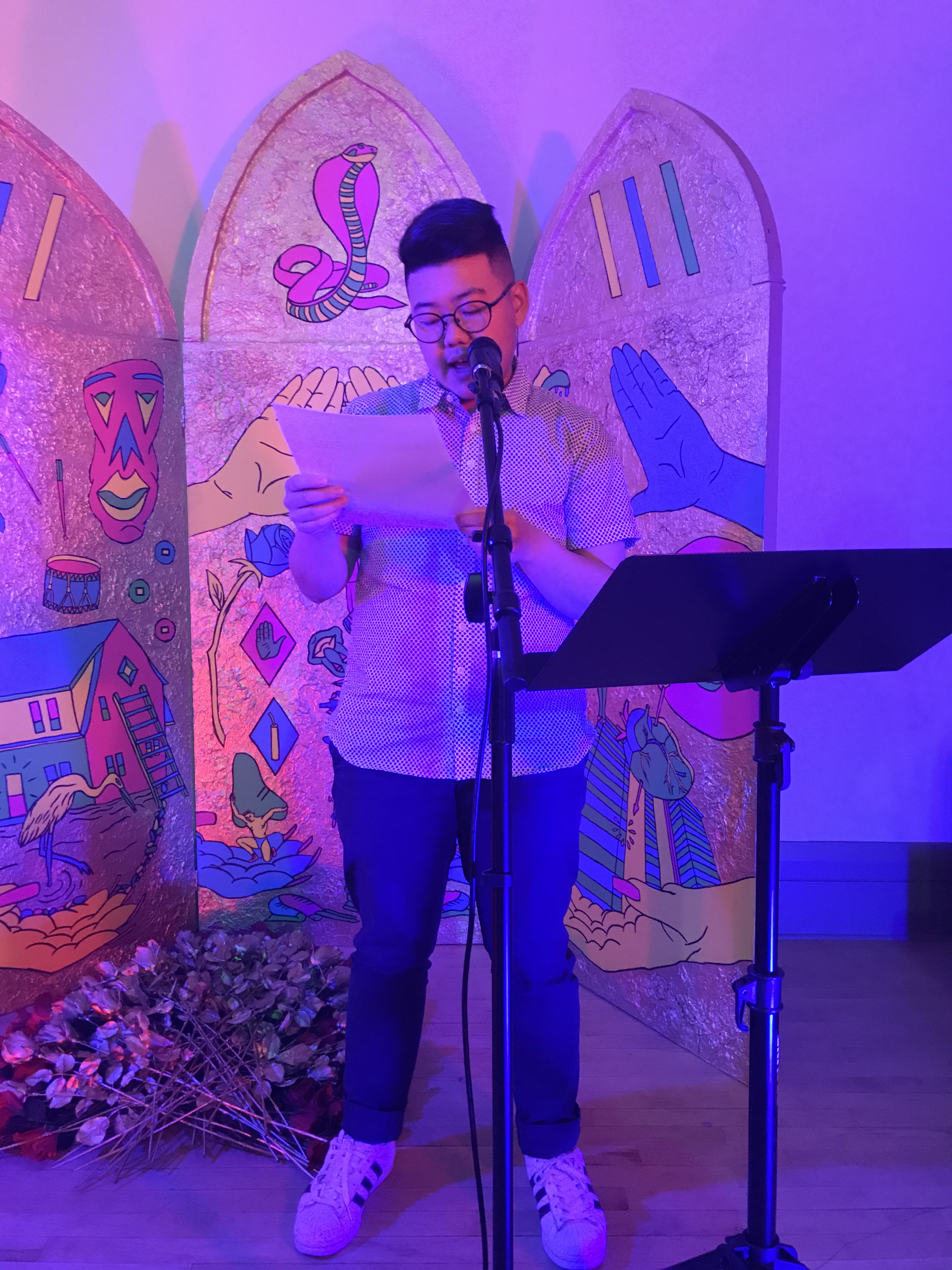 Next, Yanyi read his self-described “soft prose poems”—rich and particular renderings of the domestic. Caitlin McDonnell’s lyric narratives confronted the reality of gun violence in America and presented a tapestry of inventive first lines from novels she’s written and/or abandoned. Holly Mitchell’s lush writing strode between epithalamion and coming-of-age in a conservative landscape.
Next, Yanyi read his self-described “soft prose poems”—rich and particular renderings of the domestic. Caitlin McDonnell’s lyric narratives confronted the reality of gun violence in America and presented a tapestry of inventive first lines from novels she’s written and/or abandoned. Holly Mitchell’s lush writing strode between epithalamion and coming-of-age in a conservative landscape.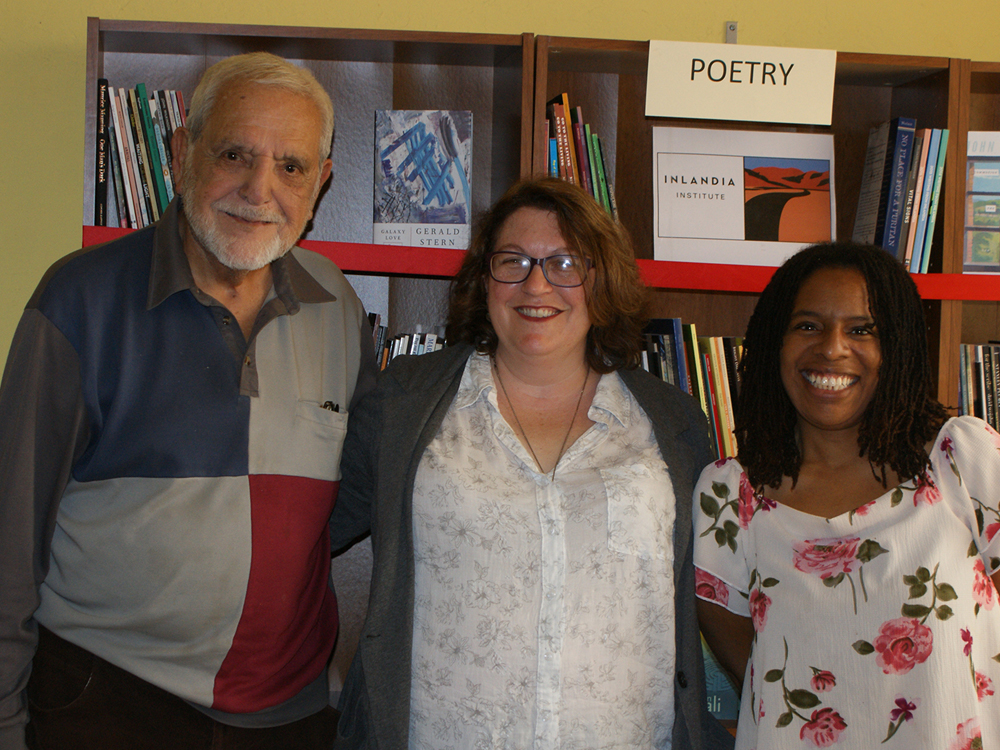 For the past decade,
For the past decade, 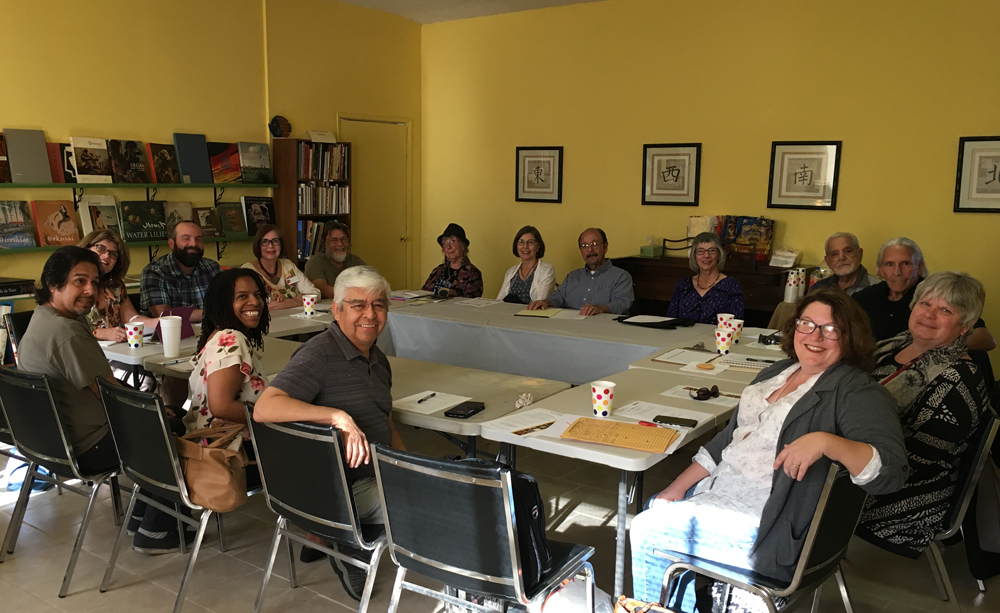
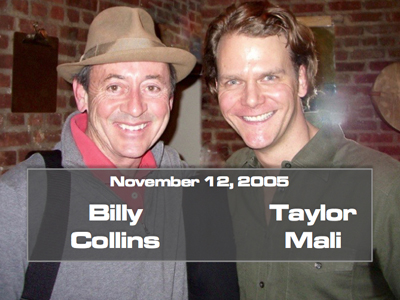 How did Page Meets Stage begin? What was your inspiration?
How did Page Meets Stage begin? What was your inspiration?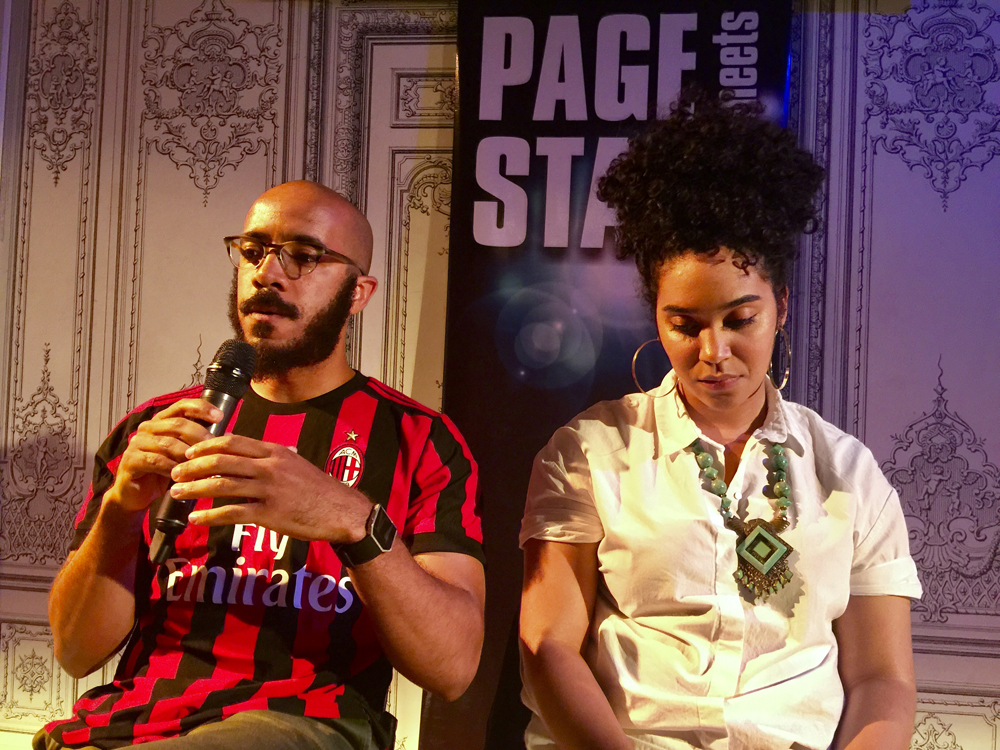 Has your mission or your vision for the organization changed over the years? What’s most important for you right now?
Has your mission or your vision for the organization changed over the years? What’s most important for you right now?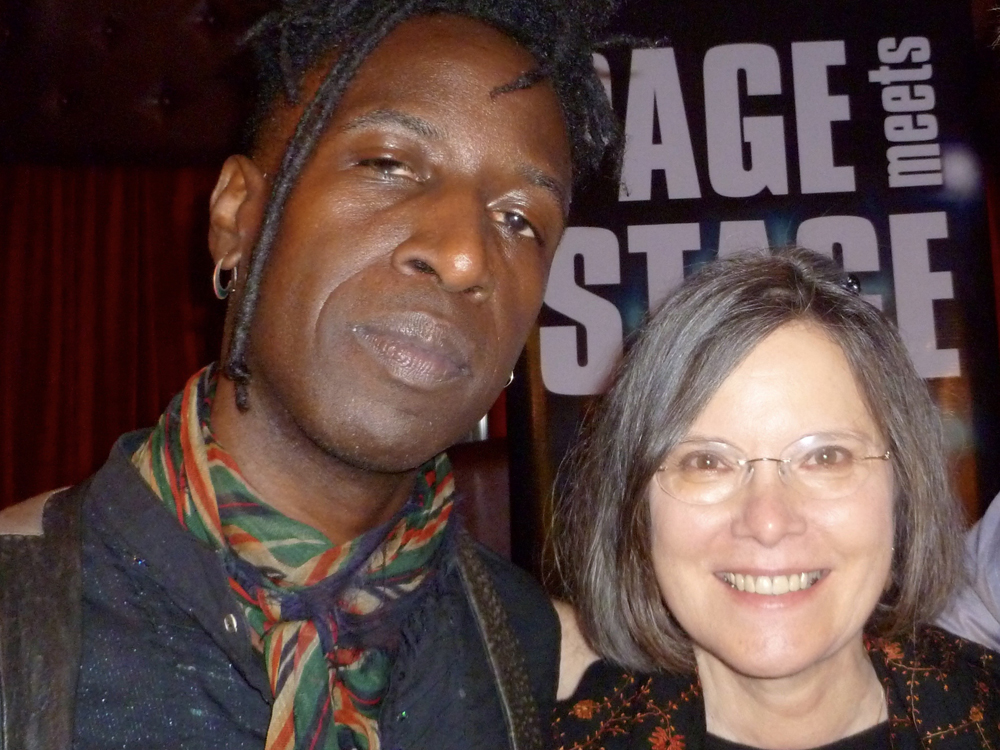 What has been your most rewarding experience as a curator and organizer?
What has been your most rewarding experience as a curator and organizer?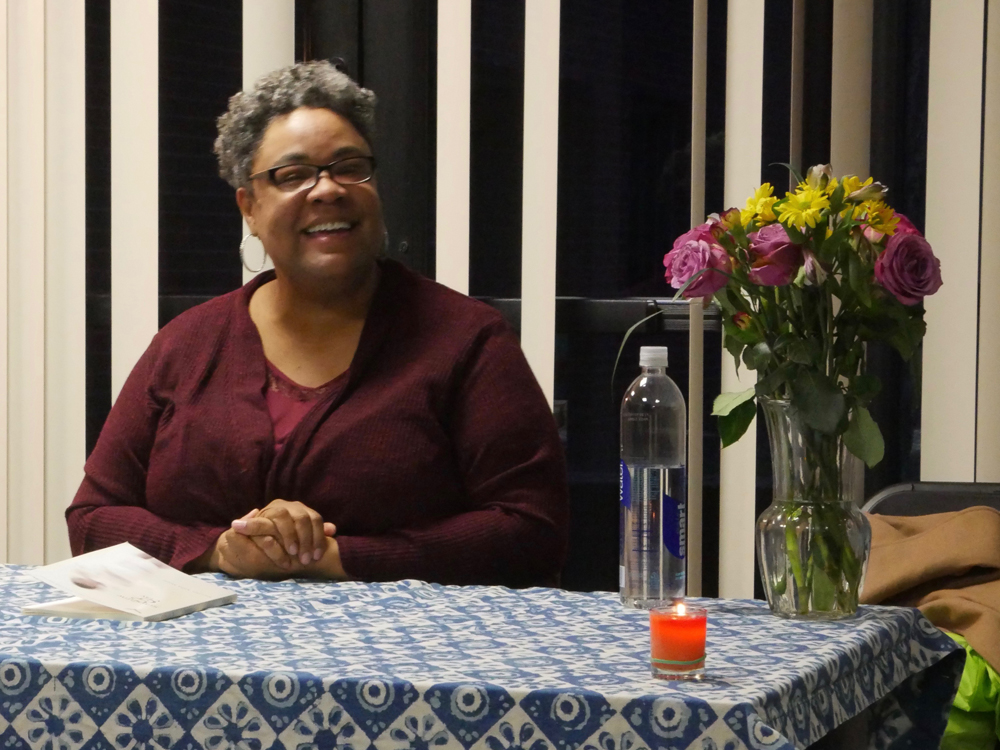 Moon, currently an assistant professor of poetry and creative writing at Agnes Scott College, is a Pushcart Prize winner, Lambda Award finalist, and Cave Canem fellow with two published books of poetry: She Has a Name (Four Way Books, 2013) and Starshine & Clay (Four Way Books, 2017). The Poets & Writers–sponsored events with Moon on March 26 included a craft talk and workshop for student writers, and an evening reading for the community.
Moon, currently an assistant professor of poetry and creative writing at Agnes Scott College, is a Pushcart Prize winner, Lambda Award finalist, and Cave Canem fellow with two published books of poetry: She Has a Name (Four Way Books, 2013) and Starshine & Clay (Four Way Books, 2017). The Poets & Writers–sponsored events with Moon on March 26 included a craft talk and workshop for student writers, and an evening reading for the community.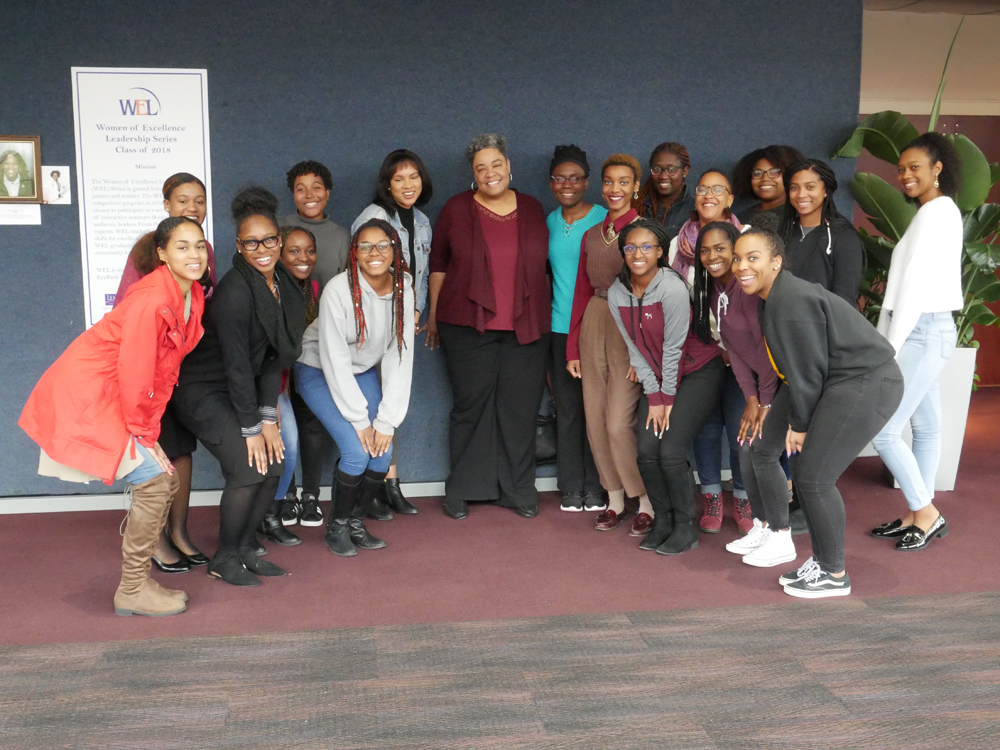
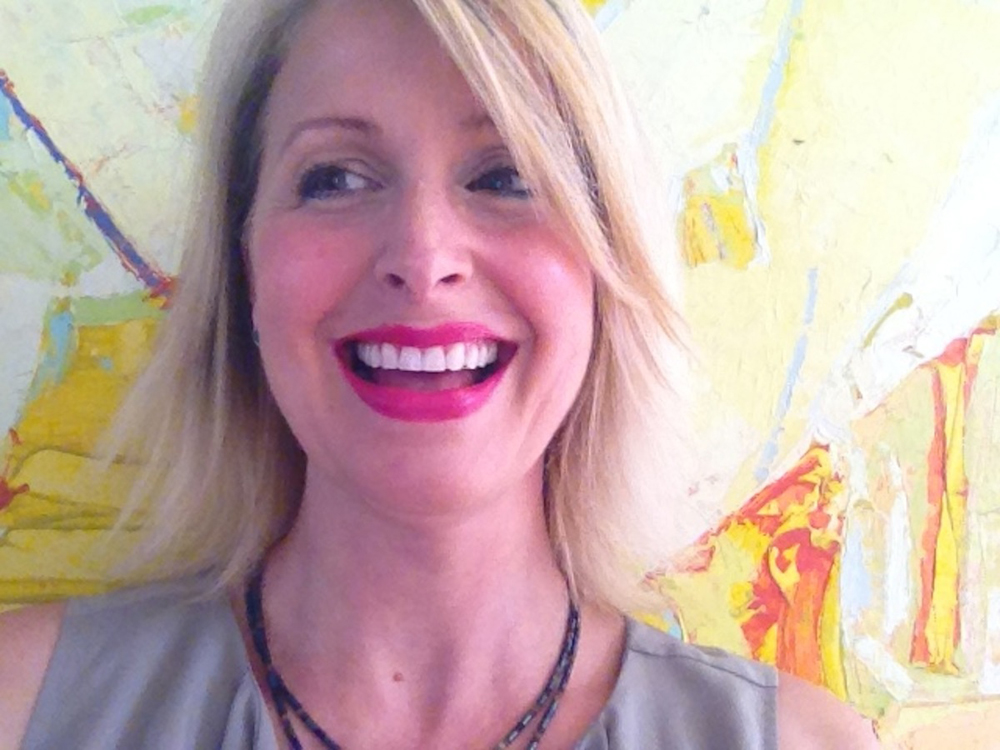 I’ve taught writing for most of my adult life, but community classes, particularly fiction workshops, occupy a special place in my heart. Unlike college classrooms or graduate programs, community classes cast a wide net, attracting a spectrum of writers of all ages, diverse backgrounds and experience. Suddenly a cross section of people that might not otherwise connect gather around a table with a single common purpose: to transform seething, raw images and words into comprehensible, moving stories. Here the CPA rubs shoulders with the waitress, the civil servant with the entrepreneur, only to find that when it comes to the vagaries of the human heart, they have more in common with one another than they might have otherwise thought.
I’ve taught writing for most of my adult life, but community classes, particularly fiction workshops, occupy a special place in my heart. Unlike college classrooms or graduate programs, community classes cast a wide net, attracting a spectrum of writers of all ages, diverse backgrounds and experience. Suddenly a cross section of people that might not otherwise connect gather around a table with a single common purpose: to transform seething, raw images and words into comprehensible, moving stories. Here the CPA rubs shoulders with the waitress, the civil servant with the entrepreneur, only to find that when it comes to the vagaries of the human heart, they have more in common with one another than they might have otherwise thought.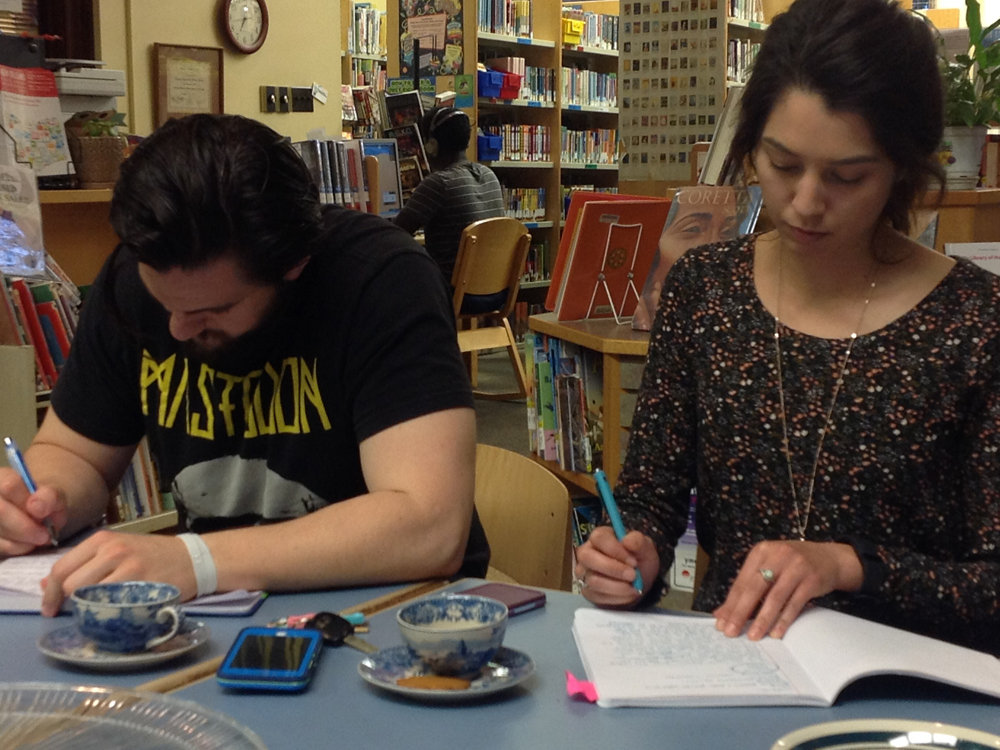 Each week, we talked a bit of shop and about technique, but the bulk of our time was spent in heavily guided exercises that began with pre-writing, specifically with take no prisoner questions centering on character, motivation, conflict, and stakes. Together these answers helped to clarify what can stymy even the most advanced of writers: a scene’s given function in the story’s overall arc. What followed was a sustained writing period that alternated between gentle nudging on my part about juggling details around setting, movement, interiority, backstory, and dialogue, and brief periods of silence during which participants scribbled at record speed.
Each week, we talked a bit of shop and about technique, but the bulk of our time was spent in heavily guided exercises that began with pre-writing, specifically with take no prisoner questions centering on character, motivation, conflict, and stakes. Together these answers helped to clarify what can stymy even the most advanced of writers: a scene’s given function in the story’s overall arc. What followed was a sustained writing period that alternated between gentle nudging on my part about juggling details around setting, movement, interiority, backstory, and dialogue, and brief periods of silence during which participants scribbled at record speed.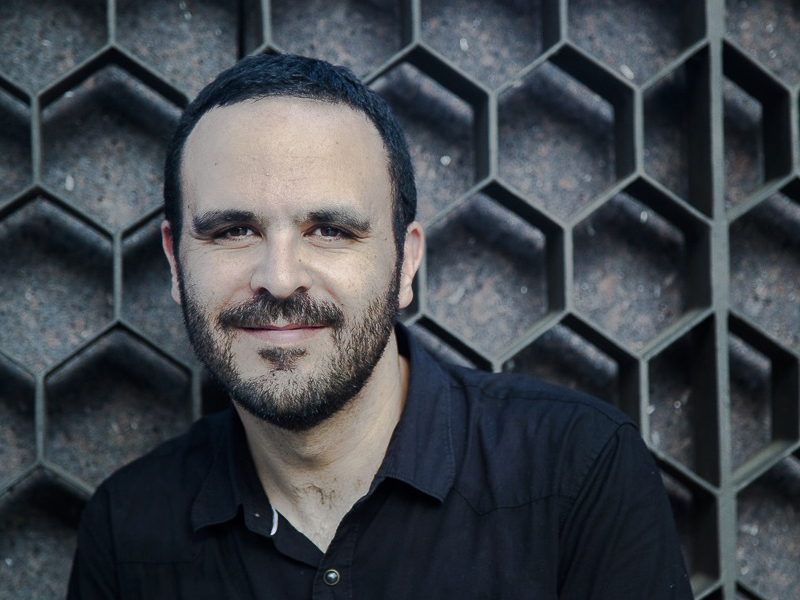 When Hasbún moved to Houston in 2014, he found that although the city was home to a thriving literary scene and over a million Spanish speakers, writing workshops in Spanish were few and far between. Hasbún began to offer his own workshops to fill the gap.
When Hasbún moved to Houston in 2014, he found that although the city was home to a thriving literary scene and over a million Spanish speakers, writing workshops in Spanish were few and far between. Hasbún began to offer his own workshops to fill the gap.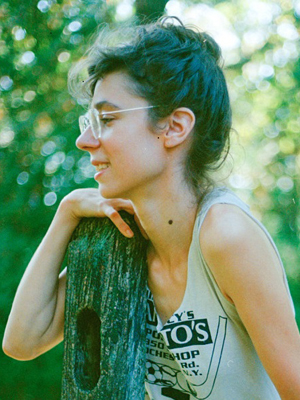 Interdisciplinary practice has been a major concern of my work ever since I moved to New York in 2008 to immerse myself in its creative scenes as a first step toward writing about art professionally. I began attending events at a range of venues like Judson Memorial Church, Roulette,
Interdisciplinary practice has been a major concern of my work ever since I moved to New York in 2008 to immerse myself in its creative scenes as a first step toward writing about art professionally. I began attending events at a range of venues like Judson Memorial Church, Roulette, 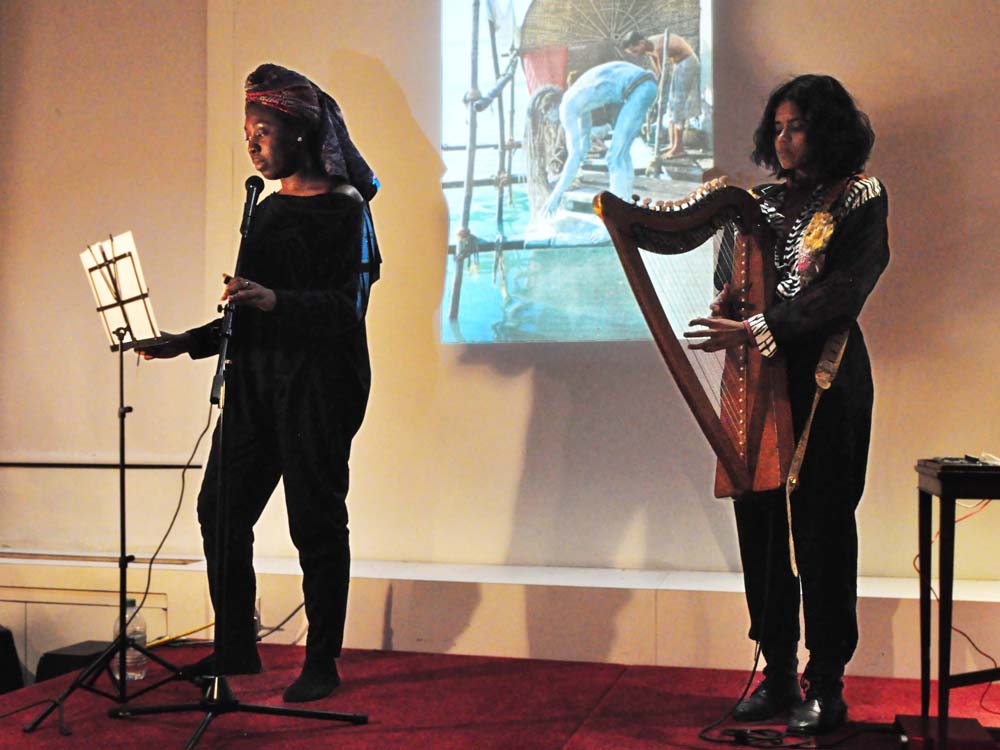 I have since become the curator of Ekphrazein, and on February 16, we hosted our sixth reading held in the Jung Center’s first floor event space, with support from Poets & Writers’ Readings & Workshops program. The thematic focus of the night was ashes, and each artist performed against a projection of their chosen ash image. The program began with multimedia artist Akeema-Zane reading poetry while accompanied by harpist Elsz. Poet Geoffrey Olsen was second on the bill, which concluded with a performance of improvised music and dance featuring Jason Kao Hwang (violin), Devin Brahja Waldman (saxophone), Megumi Eda (dance), and Yoshiko Chuma (dance). The presentations ranged between painstaking poetic craft and the playful abandon of free jazz, with each set activating a charged intimacy between artist and audience. Afterwards we all went up to ARAS for a candlelit wine reception, where I observed the enthusiasm with which audience members approached performers to engage in conversation about the night. It was energizing to see new acquaintances made and new doors opened to potential creative fusions across disciplines. I look forward to seeing what works and alliances this uncategorizable series will galvanize in the future.
I have since become the curator of Ekphrazein, and on February 16, we hosted our sixth reading held in the Jung Center’s first floor event space, with support from Poets & Writers’ Readings & Workshops program. The thematic focus of the night was ashes, and each artist performed against a projection of their chosen ash image. The program began with multimedia artist Akeema-Zane reading poetry while accompanied by harpist Elsz. Poet Geoffrey Olsen was second on the bill, which concluded with a performance of improvised music and dance featuring Jason Kao Hwang (violin), Devin Brahja Waldman (saxophone), Megumi Eda (dance), and Yoshiko Chuma (dance). The presentations ranged between painstaking poetic craft and the playful abandon of free jazz, with each set activating a charged intimacy between artist and audience. Afterwards we all went up to ARAS for a candlelit wine reception, where I observed the enthusiasm with which audience members approached performers to engage in conversation about the night. It was energizing to see new acquaintances made and new doors opened to potential creative fusions across disciplines. I look forward to seeing what works and alliances this uncategorizable series will galvanize in the future.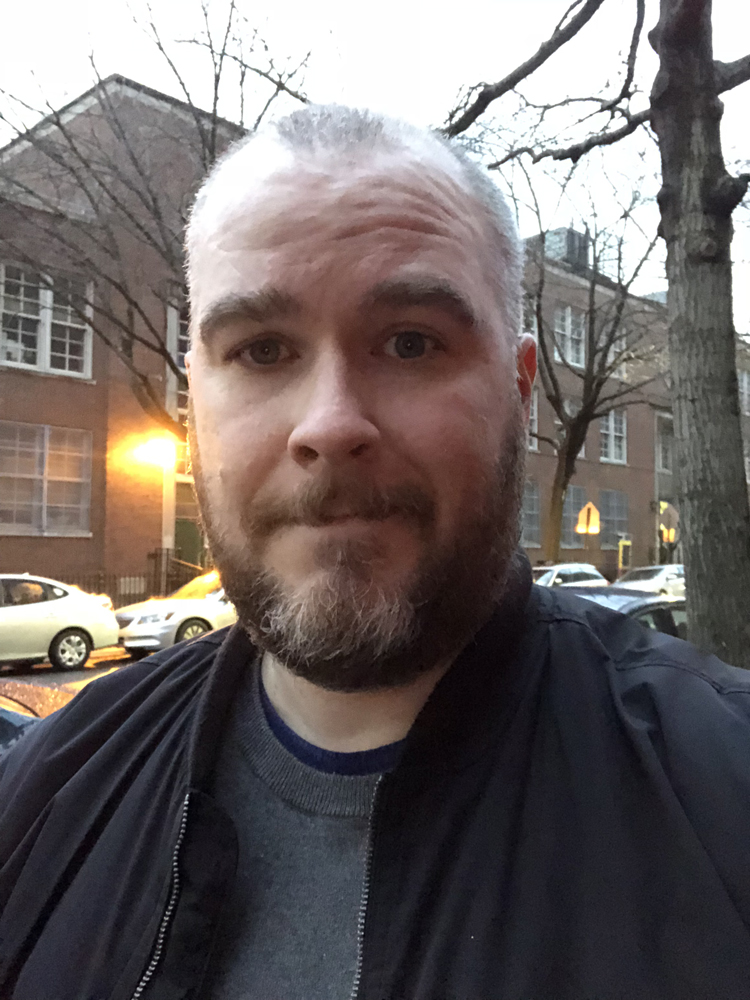 How did Newtown Literary begin? What prompted you to launch it?
How did Newtown Literary begin? What prompted you to launch it?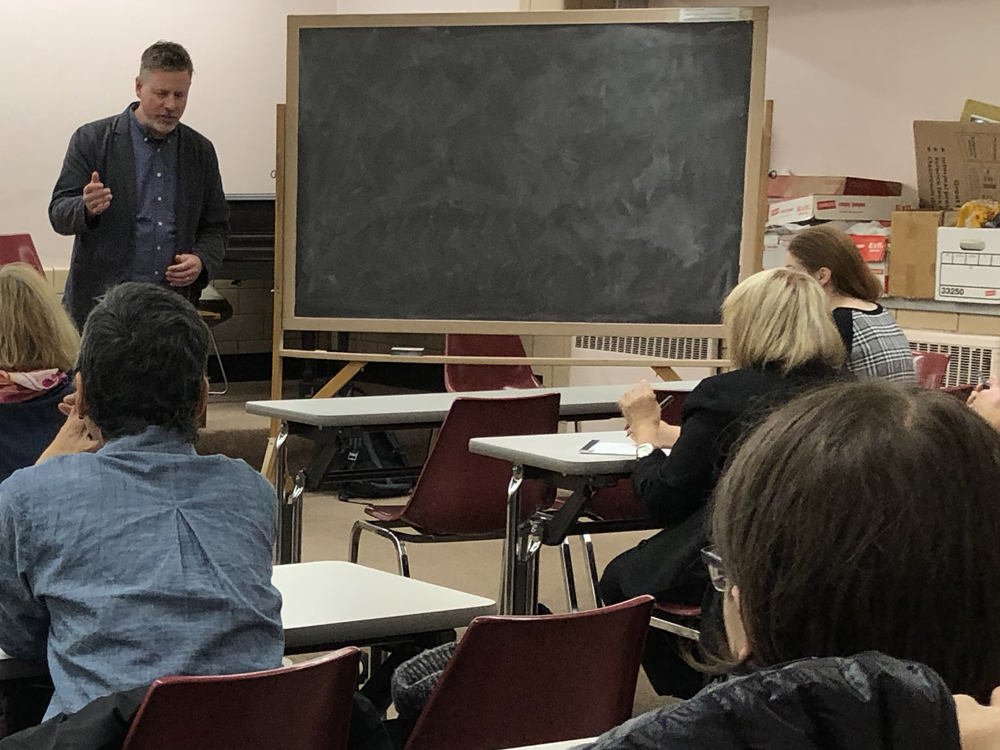 The literary events scene in Queens is going strong. What’s next?
The literary events scene in Queens is going strong. What’s next?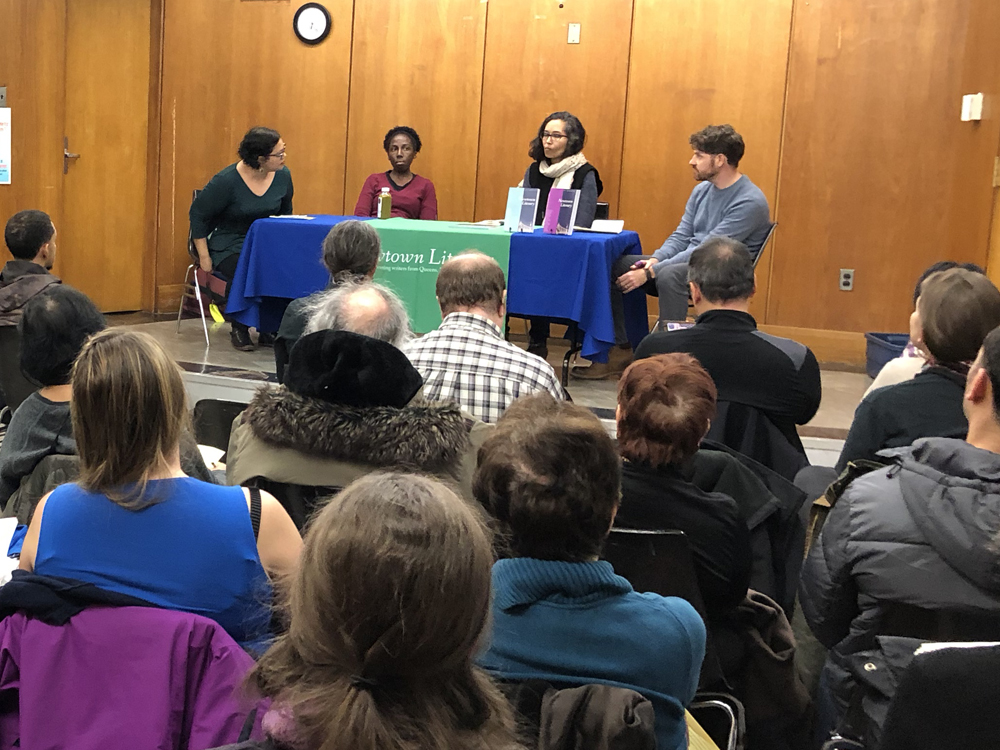 In addition to being a literary organizer, you’re also a creative writer. What’s it like wearing two hats, so to speak?
In addition to being a literary organizer, you’re also a creative writer. What’s it like wearing two hats, so to speak?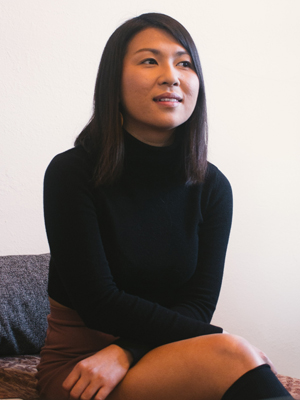 In the spirit of this tradition, with sponsorship from the Poets & Writers’ Readings & Workshops program, the AfroSurreal Writers hosted fiction writer Learkana Chong, along with Dera R. Williams and Shannon Holbrook, for a few hours of writing, AfroSurreal games, and vegetarian soul food last November.
In the spirit of this tradition, with sponsorship from the Poets & Writers’ Readings & Workshops program, the AfroSurreal Writers hosted fiction writer Learkana Chong, along with Dera R. Williams and Shannon Holbrook, for a few hours of writing, AfroSurreal games, and vegetarian soul food last November.